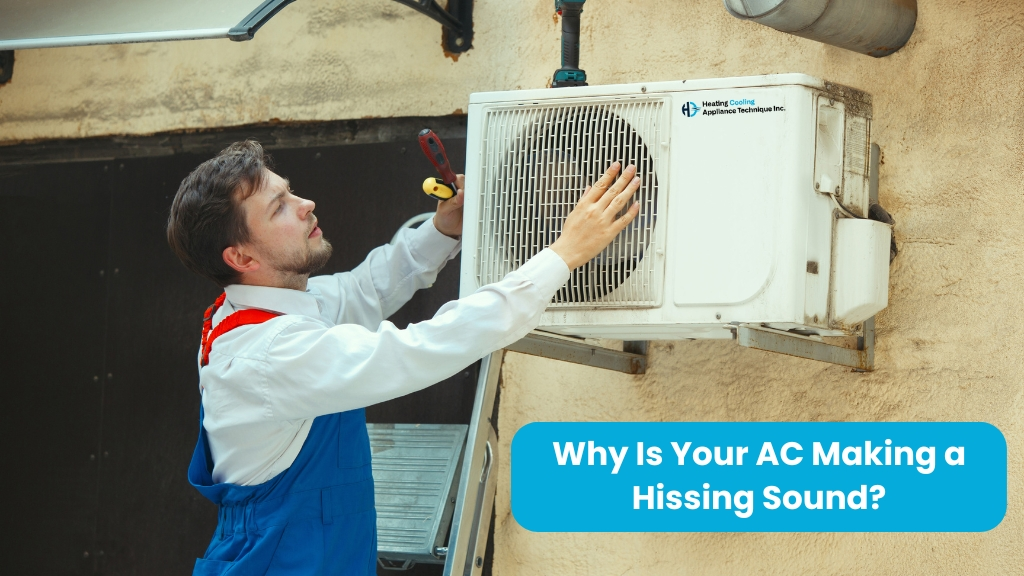
When it comes to air conditioning systems, hearing a strange hissing sound can be concerning. If your AC is making noises, it shouldn’t, it may be a sign of a larger issue hiding beneath the surface. Whether you’re a homeowner looking to maintain your system or an HVAC technician diagnosing the issue, understanding the potential causes and solutions is crucial.
What Causes an AC to Make a Hissing Sound?
Your air conditioner is a complex system with multiple components, but it shouldn’t make a prolonged or bothersome hissing noise. Here’s what that sound might indicate:
1. Refrigerant Leak
One of the most common causes of a hissing sound in an AC system is a refrigerant leak. Refrigerant, often referred to as Freon, is the substance responsible for cooling the air. Refrigerant lines in your AC are pressurized, and when a leak occurs, the escaping gas can create a constant hissing or bubbling noise.
Signs of a refrigerant leak include:
- Frost or ice buildup on the refrigerant lines
- Warm air blowing out of the vents
- Increased energy bills due to inefficient cooling
Since refrigerant is critical to the function of your AC, a leak should be addressed immediately by a professional. It’s essential to stop the leak, recharge the refrigerant, and ensure the system is pressurized to the correct levels.
2. High Compressor Pressure
The compressor is at the heart of your AC—it circulates refrigerant through the system. If the compressor is under too much pressure, a high-pitched hissing or whistling noise may occur. Excess pressure in the compressor can lead to dangerous conditions, and newer systems often have failsafe mechanisms to shut the unit off to prevent damage.
Key indicators of high compressor pressure include:
- A loud hissing or screeching noise when the system starts
- The AC system shutting off unexpectedly
This is a potentially hazardous issue, so it’s critical to shut the system off immediately and call an HVAC technician to inspect it.
3. Leaky Ducts
Hissing noises aren’t always from the AC unit itself—they could be coming from your ductwork. If there are holes, gaps, or cracks in your air ducts, conditioned air may escape, creating a hissing or high-pitched whistling sound.
Watch for these signs of leaky ducts:
- Difficulty maintaining a consistent temperature in your home
- Increased energy bills
- Hissing noises when the HVAC system is running
While leaky ducts may not pose an immediate safety risk, they can significantly impact your AC’s efficiency and increase cooling costs over time.
4. Thermostatic Expansion Valve Operation
Not all hissing sounds are a sign of trouble. The thermostatic expansion valve, which relieves pressure in the system as part of normal operation, may create occasional, low-level hissing sounds. However, if the noise persists or becomes louder, it could indicate a malfunction that requires professional attention.
5. Malfunctioning Reversing Valve (Heat Pumps Only)
If your home uses a heat pump instead of a traditional AC, the hissing noise could stem from a faulty reversing valve. This valve enables the heat pump to switch between heating and cooling modes. A stuck or damaged valve may cause a continuous hissing noise.
Solutions for AC Hissing Sounds
The most important step when you hear an unusual noise from your AC is to avoid DIY fixes that might worsen the problem. Instead, rely on these professional solutions:
For Refrigerant Leaks:
- Shut the system off to prevent further damage.
- Contact a professional HVAC technician to locate and repair the leak, then recharge the refrigerant.
For High Compressor Pressure:
- Turn off the AC immediately.
- Allow an HVAC professional to inspect the compressor and relieve excess pressure safely.
For Leaky Ducts:
- Have an expert perform a full duct inspection.
- Seal any holes or gaps with professional-grade duct sealant to restore efficiency.
For Thermostatic Expansion Valves or Reversing Valves:
- Schedule a professional inspection to ensure these components are operating correctly and replace them if needed.
Preventing Hissing Sounds in the Future
While some AC problems are unavoidable, regular maintenance can significantly reduce the risk of hissing sounds and other issues. Here’s how to keep your HVAC system running smoothly:
1. Schedule Professional Inspections
Have an HVAC technician inspect your system at least once a year. This proactive measure can catch potential issues before they lead to costly damage.
2. Replace Air Filters Regularly
Dirty or clogged filters can strain your system, leading to inefficiencies and potential maintenance issues. Replace or clean filters every 1-3 months, depending on usage and manufacturer recommendations.
3. Clean the Condenser and Coils
Ensure the outdoor unit is clear of debris like leaves, dirt, and grass clippings, and clean the condenser coils to maintain proper airflow.
4. Seal Ductwork Properly
Leaky ducts don’t just cause noise—they waste energy. A professional duct seal can improve both efficiency and comfort in your home.
5. Monitor Refrigerant Levels
Low refrigerant levels can strain the system and lead to leaks. An annual check by a professional helps ensure the system has adequate refrigerant.
Final Thoughts
A hissing sound from your AC is often an early warning sign of a problem requiring immediate attention. Ignoring the noise could lead to more serious and costly issues, so don’t hesitate to act. Whether it’s a refrigerant leak, high compressor pressure, or leaky ducts, a licensed HVAC technician can diagnose and resolve the problem effectively.
If you’re a homeowner, staying vigilant about unusual noises and scheduling regular maintenance can help you avoid unexpected breakdowns during peak seasons. For HVAC technicians, understanding the underlying causes of hissing sounds is key to providing timely and effective solutions.
Don’t wait until a minor issue becomes a major headache. If your AC is making a hissing sound, turn it off and contact a reliable HVAC professional to ensure your home stays cool and comfortable all summer long!



